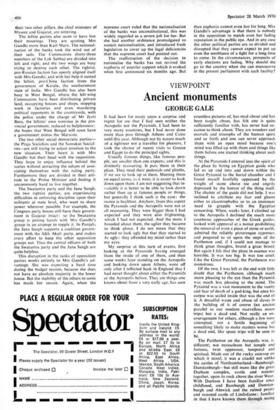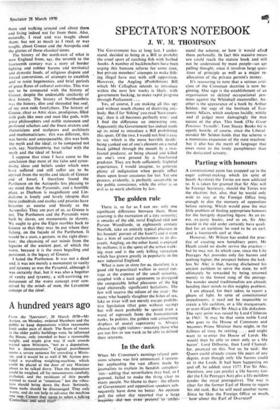VIEWPOINT
Ancient monuments
GEORGE GALE
It had been for many years a surprise and regret for me that I had seen neither the Acropolis nor the Pyramids. rhad been to very many countries, but I had never done more than pass through Athens and Cairo until this year. Although not by nature much of a sightseer nor a traveller for pleasure, I took the chance of recent visits to Greece and Egypt to do the principal sights.
Usually famous things, like famous peo- ple, are smaller than one expects; and this is distinctly reassuring. It puts them in their place. They need their pedestals and plinths, if we are to look up at them. Meeting them on equal terms, as it were, it is easier to look down upon them. I am not suggesting that in- variably it is better to be able to look down rather than up at famous people or things, but generally I think such is the case: the stance is healthier. Anyhow, from this aspect the Pyramids and the Acropolis were not at all reassuring. They were bigger than I had expected and they were also frightening, which I had not expected. And the more I brooded about them, the uglier they became to think about. I do not mean that they started to look ugly but that they started to be ugly: they offended my mind rather than my eyes.
My surprise at this turn of events, first looking at the Pyramids having emerged from the inside of one of them, and then some weeks later standing on the Acropolis and looking down upon Athens, wore off only after I reflected back in England that I had never thought about either the Pyramids or the Acropolis before. They are things one knows about from a very early age, has seen countless pictures of, has read about and has been taught about, has felt one is quite sufficiently familiar with, has never had oc- casion to think about. They are wonders and marvels and triumphs of the human spirit and so forth and one can never approach them with an open mind because one's. mind was filled up with them and things like them before one started thinking about such things.
At the Pyramids I entered into the spirit of the place by hiring an Egyptian guide who led us up and into and down within the Great Pyramid to the burial chamber and I found myself fearfully oppressed by the weight of stone above me and angrily
depressed by the horror of the thing itself. The chatter of the guide did not help. I was
inclined to attribute my fear and gloom either to claustrophobia or to an imminent need to grapple with the Egyptian censorship. When, weeks later, I climbed up to the Acropolis I declined the much more courteous approaches of the Greek guides, looked with approval at a notice prohibiting the removal of even a piece of stone or earth, admired the reliably picturesque cypresses, and prepared to sit upon the steps of the Parthenon and, if I could not manage to think great thoughts, brood a great brood.
But again I felt that the place in essence was horrible. It was too big. It was too cruel. Like the Great Pyramid, the Parthenon was monstrous.
Of the two, I was left at the end with little doubt that the Parthenon, although much more pleasing to the eye than the Pyramid, was much less pleasing to the mind. The Pyramid was a vast monument to the vanity and fear of death of a god-king, but once his corpse was sealed inside that was the end of it. A dreadful waste and abuse of slaves in the building of it of course (an ancient
parallel to our modern marvellous moon trips) but a dead end. Not really an en-
couragement for others, although a few were attempted, not a fertile beginning of something likely to make matters worse but a dead end, like space trips will be seen to be.
The Parthenon on the Acropolis was, is, different; not mausoleum but temple and fortress, twin oppressor, temporal and spiritual. Made out of the rocky outcrop on which it stood, it was a citadel not unlike the castles of Northumberland--Bamburgh. Dunstanburgh—but still more like the great Durham complex, castle and minster together, upon its rock above the river Wear. With Durham I have been familiar since childhood, and Bamburgh and Dunstan- burgh and Alnwick and the ruined proiry and restored castle of Lindisfarne: familiar in that I have known them through seeing them and walking around and about them and living indeed not far from them. Also, naturally, I read and was taught about them; but not as much as I read, or was taught, about Greece and the Acropolis and the glories of those classical times.
The history of the north-east of what is now England from, say, the seventh to the fourteenth century was a story of border fighting and robber barons and territorial and dynastic feuds, of religious dispute and forced conversions, of attempts to establish and to resist hegemonies, and brief periods of great flares of cultural activities. This was not to be compared with the history of Greece, despite the undeniable similarity of that history. The history of Northumbria was the history, dim and shrouded but real, of my own rude forefathers. The history of Greece, clear as Attic skies, prodigious, filled with gods like men and men like gods, with great philosophers and noble statesmen and profound scholars and the finest orators and rhetoricians and sculptors and architects and mathematicians: this was different, this was heroic and unsurpassable, this was both the myth and the ideal, to be compared not with, say, Northumbria. but rather with the myth and the ideal of Israel.
I suppose that since 1 have come to the conclusion that most of the false and tyran- nising ideas and beliefs under which men have suffered and still suffer are to be derived from the myths and ideals of Greece and of Israel, I therefore found the Parthenon on the Acropolis less pleasing to my mind than the Pyramids; and a horrible place, as Durham is magnificent and Lin- disfzrne is lonely and lovely (despite that these cathedrals and castles and priories have histories as coarse and bloody as the Acropolis). They are part of us, as Greece is not. The Parthenon and the Pyramids were built by slaves, are monuments to slavery. We ought to give the Elgin marbles back to Greece so that they may be put where they belong, on the facade of the Parthenon. It would be a start, a gesture. in the right direc- tion: the cleansing of our minds from the legacies of the ancient past, of which the worst, because it is the most beguiling and persistent, is the legacy of Greece.
I hated the Parthenon. It was not a dead end, it was not merely a monument to vanity and tyranny as was the Pyramid, although it was certainly that, but it was also a begetter of vanity and tyranny, a still-surviving en- dorsement of the worst concept ever con- ceived by the minds of men, the Levantine concept of the ideal.



































 Previous page
Previous page